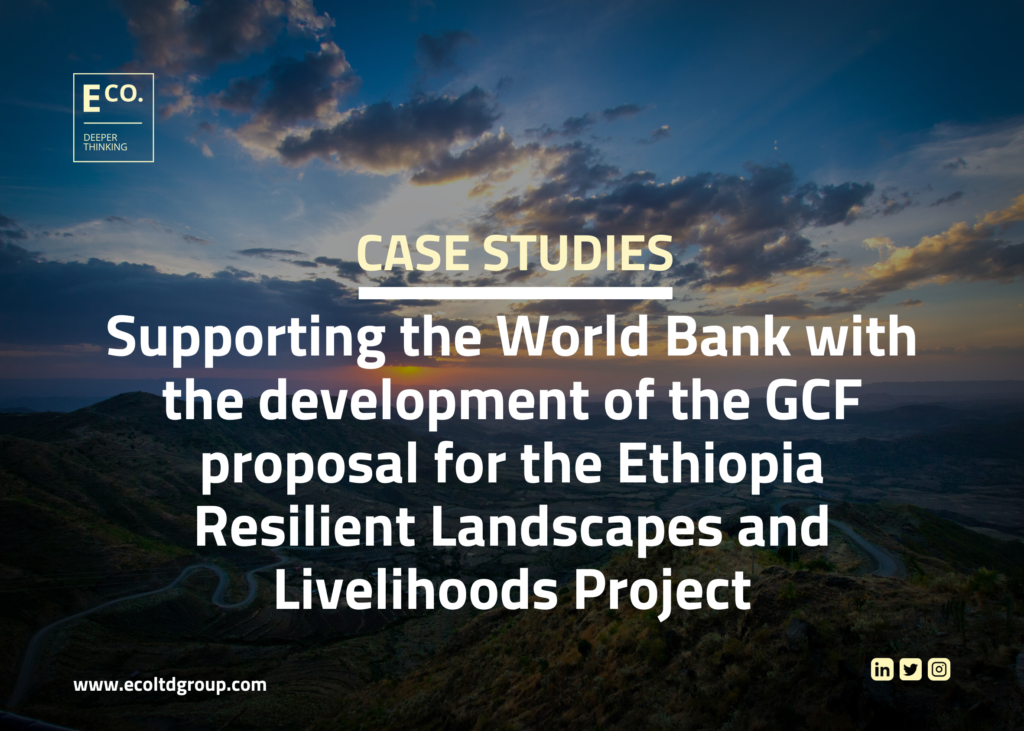Supporting the World Bank with the development of the GCF proposal for the Ethiopia Resilient Landscapes and Livelihoods Project

After helping to develop a GCF Proposal for the Ethiopia Resilient Landscapes and Livelihoods Project, we were delighted to see that on 21 August 2020 the Green Climate Fund (GCF) Board approved this project, with the total financing of USD 296.2 million, out of which the GCF provides USD 165.3 million in a combination of grants and concessional loans. E Co. provided technical support and GCF knowledge and expertise to the World Bank in the development of the GCF concept note and the initial versions of the full funding proposal. Read more about what E Co. consultant Marijan Gajsak had to say about the project and why it’s essential for Ethiopia.
About the Ethiopia Resilient Landscapes and Livelihoods Project
Ethiopia has a long history of coping with extreme weather events. Rainfall is highly erratic and typically falls in the form of intensive convective storms spawned by the country’s varied topography. Over the past three decades Ethiopia has experienced countless localised drought events and seven major droughts, five of which were associated with famines. Future climate variability and change are expected to accelerate already high levels of land degradation and soil erosion, increase vulnerability to droughts and floods, and negatively impact agricultural productivity. Due to its impact on agricultural productivity alone, soil erosion currently costs the economy of Ethiopia about USD 305 million per year.
This approved project is essential for the development of the Ethiopian land/agricultural sector. A number of programs and projects for Sustainable Land Management (SLM) have been implemented in Ethiopia since the early 1970s, aimed at promoting private and collective efforts to conserve natural resources. This particular project is the third subsequent SLM project by the World Bank in Ethiopia and the first with a key focus on enhancing climate resilience. This is apparent from the substantial amount of funds provided by the GCF for covering incremental climate costs.
#GCFB26 | Congratulations to #Ethiopia and @WorldBank Ethiopia for the approval of the cross cutting and innovative project for Resilient Landscapes and Livelihoods | E Co. supported the WB to prepare the concept note funding proposal – we wish you all the best | #climatefinance https://t.co/yB20QebVGn
— E Co. (@ecoltdnews) August 19, 2020
The proposed interventions
Sustainable management of natural resources, particularly soil and water, is of utmost importance to Ethiopian agriculture. The approved project will significantly enhance the resilience of the target populations’ livelihoods to climate change impacts. The proposed interventions will enhance the resilience of interventions in the government’s second phase SLM programme through an integrated package of activities, and scale up the programme while targeting the watersheds and communities that are most vulnerable to climate change.
Project interventions include soil and water conservation (SWC) structures, reforestation and assisted natural regeneration, as well as low-emission and climate-resilient agriculture practices. The scaling-up of SLM for climate change adaptation and mitigation will be complemented with transformational investments in income opportunities, resilient livelihoods, and the productive value chains associated with SLM. It is designed to strengthen incentives for communities to maintain restored landscapes; co-finance for the promotion of low carbon household energy solutions; and land tenure system established and enhanced. There is a particular focus on gender mainstreaming and inclusion of youth into the value chains.
How E Co. were involved
The E Co. team provided technical support, as well as knowledge and expertise of GCF funding requirements to the World Bank in this project. E Co. was instrumental in providing technical inputs related to vulnerability assessments and envisaged project outcomes in order to adjust and emphasise full climate adaptation of the approved project.
We utilised our expertise in aligning the project’s structure and activities with the requirements of the GCF; we supported the preparation of the GCF Concept Note and full Funding proposal, which included a clear and strong adaptation additionality argument, building on inputs provided by the World Bank project team. Additionally, the E Co. team integrated the results of dedicated feasibility studies throughout the GCF proposal.
If you’d like to learn more about this project or would like to discuss a similar project, please feel free to reach out to one of our climate finance experts at amy@ecoltdgroup.com.
Looking for insight into climate finance? Look no further
Let’s accelerate progress together: Get in touch with our climate finance consultants to discuss a project you’re working on. Email us at: amy@ecoltdgroup.com or find us at the following:
Twitter: @ecoltdnews
LinkedIn: E Co.
Instagram: @ecoltdnews
Please feel free to share your comments below or send an email to: gcfinsight@ecoltdgroup.com